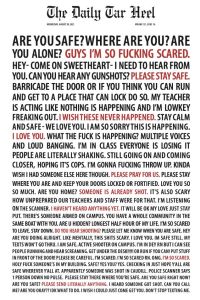Join getAbstract to access the summary!

Join getAbstract to access the summary!
Amaris Castillo
How The Daily Tar Heel designed the front page everyone is talking about
"I don’t think anyone else except this generation could give voice and legs to this feeling of what it’s like to be on lockdown..."
Poynter.org, 2023
What's inside?
The viral front page of UNC’s Daily Tar Heel is a harrowing visual narrative of fear of an active shooter.
Recommendation
The Daily Tar Heel, a student newspaper, had planned for its latest edition to cover the University of North Carolina at Chapel Hill’s upcoming football season. Then, one day in late August 2023, an active shooter threatened the campus – and fatally shot his faculty advisor. Inspired by text messages exchanged during the lockdown, the newspaper’s staff pivoted to a new narrative. The resulting text-message-only front page not only conveyed the fear and helplessness UNC’s students and their families faced in those harrowing hours, but it also captured the angst of an era where school shootings have become an all-too-regular occurrence nationwide.
Summary
About the Author
Amaris Castillo is a writing and research assistant for the NPR Public Editor and a contributor to Poynter.org.


















Comment on this summary